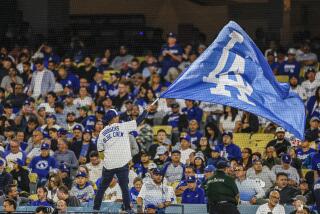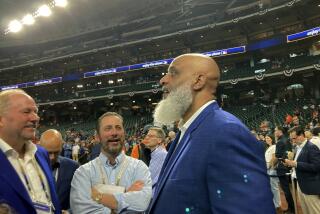Owners Set Stage for Baseball Strike : Labor: Collective-bargaining proposal reportedly involves salary cap and revenue sharing.
- Share via
Major league baseball owners, meeting in Cincinnati on Wednesday, set the stage for a second-half strike by the players’ union when they unanimously agreed to a collective-bargaining proposal calling for a new economic system based on a salary cap.
Details of the proposal will not be revealed until it is presented to the union in a negotiating session in New York next Tuesday, but the owners also moved to prevent defections of the type that have eroded their solidarity in seven previous labor confrontations. Any labor agreement must now be approved by three quarters of the 28 owners rather than a simple majority.
Only eight owners are needed to block a deal, and there seem to be at least that many small-market teams determined to change the system by hanging tough in a prolonged work stoppage. Don Fehr, the union’s executive director, said the action was “ominous” and “extraordinarily negative.”
“It would allow eight owners to perpetuate a dispute,” Fehr said from Washington. “That is not a step in the right direction. It’s the direction of people preparing for war.”
The union considers a salary cap restrictive and fears that the owners will declare an impasse in the negotiations and unilaterally impose the new system--which would also significantly modify free agency and arbitration--if there is no agreement by the end of the season. The union’s executive board will review the proposal next Thursday in Chicago and meet again in Pittsburgh on July 11 to set a strike date--probably around Aug. 1.
Said Dodger owner Peter O’Malley, speaking from Cincinnati: “I hope the players will consider (the proposal) without rejecting it out of hand. I think it’s fair.”
A source said the new system, which includes revenue sharing among the big and small markets, would be implemented in stages and not affect any player currently in the majors.
“It’s a plan that reflects the decade and the era we live in,” interim Commissioner Bud Selig said, referring to the changing economics and the contention of chief negotiator Richard Ravitch that 19 of the 28 clubs are losing between $3 million and $12 million a year.
“We need a fairer allocation of revenues between the clubs and the players,” Selig said. “We need a closer sense of unity. We need it for a more competitive game.”
In another anticipated development, American League owners hired University of Kansas Chancellor Gene Budig as their seventh league president. He received a four-year contract and will replace Bobby Brown, retiring after 10 years in office, on Aug. 1.
More to Read
Go beyond the scoreboard
Get the latest on L.A.'s teams in the daily Sports Report newsletter.
You may occasionally receive promotional content from the Los Angeles Times.










